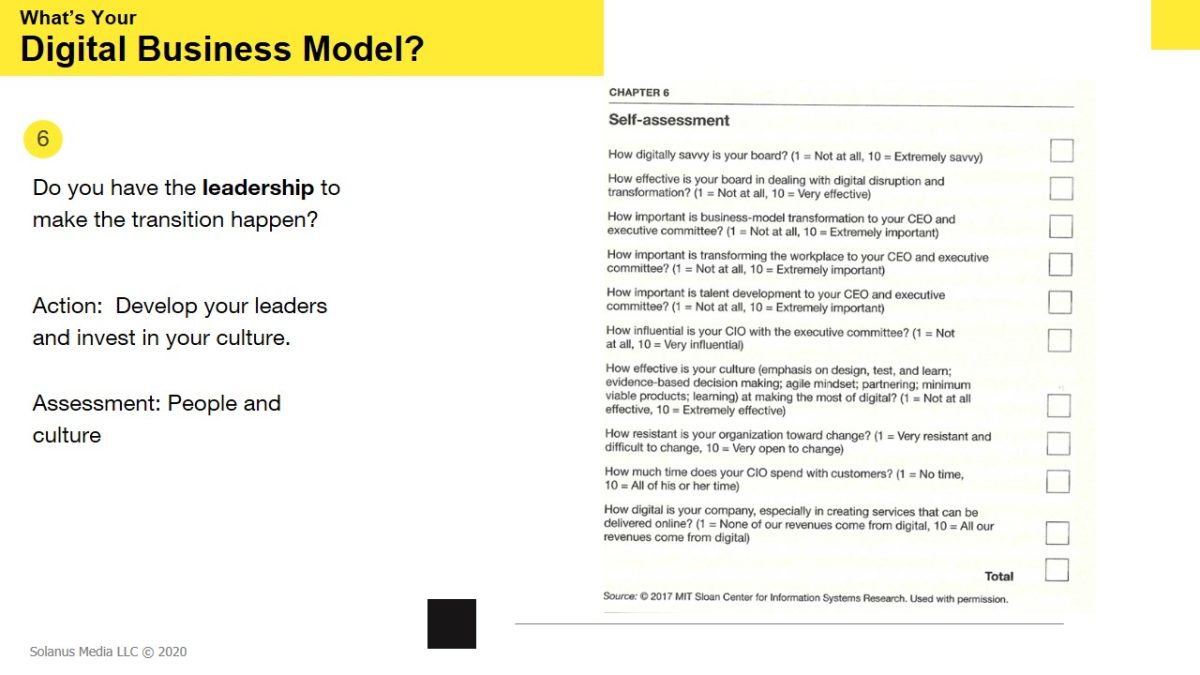- About Your Company
- Describe Business Challenge or Opportunity
- What’s Your Digital Business Model?
- What is the digital threat—and opportunity?
- Which business model is best for your enterprise’s future?
- What is your digital competitive advantage?
- How will you connect using mobile and IoT?
- What are the crucial capabilities to reinvent the enterprise?
- Do you have the crucial capabilities to reinvent the enterprise?
- Do you have the leadership to make the transition happen?
About Your Company
This presentation will examine an industrial construction company that operates in Saudi Arabia. The company in question is AYTB, which works in the industry of “multidisciplinary industrial contracting company providing a range of services and solutions to oil and gas, petrochemical, power generation and other major industrial sectors of Saudi Arabia.” It employs 6000 people and generates $811.49 in revenue and the main office is located in Jubail. AYTB has two types of core products – industrial, including construction, plant turnaround, industrial services, and related services, and facility management, which includes catering, housing, and remote services. The customer segments of AYTB are businesses that operate in the oil and gas industries, chemical and petrochemical, power plants, aluminum, and steel sectors.
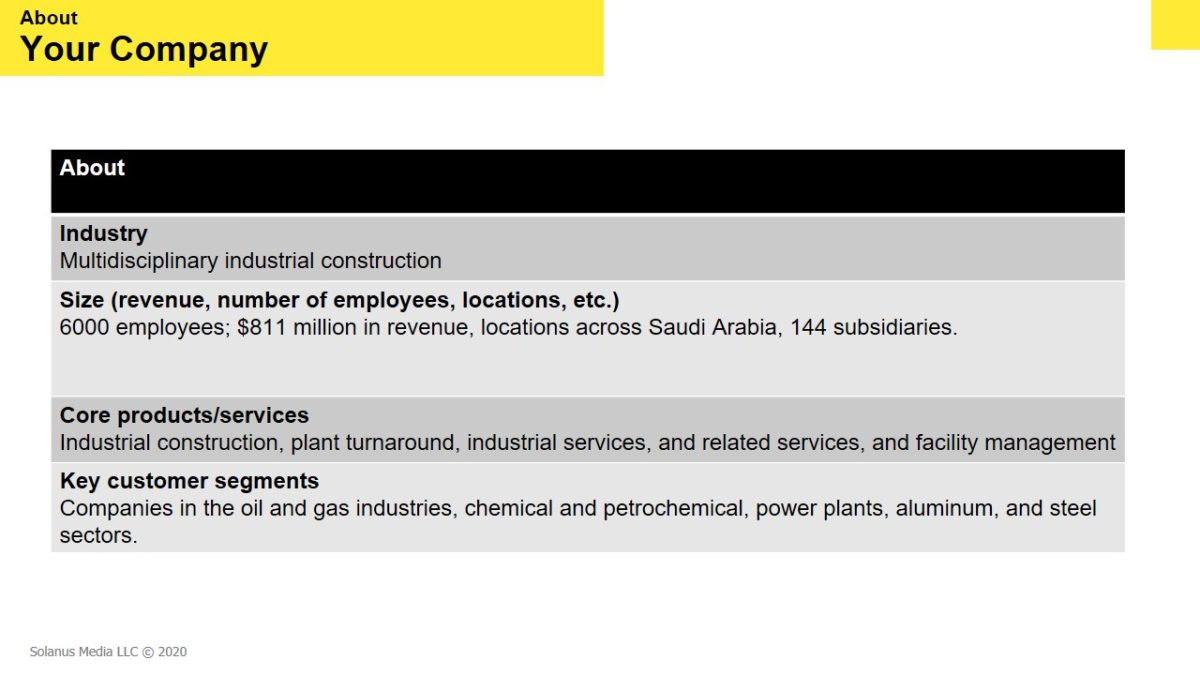
Describe Business Challenge or Opportunity
Describe the business challenge (or opportunity) for which a digital transformation/business model may be a viable solution.
- The “opportunity of new business models for traditional competitors” threat;
- Currently, the company uses standard approaches to construction;
- Digital transformation of the way industrial buildings are constructed is happening;
- Internet of things (IoT) and smart buildings;
- New business model – designing and constructing industrial facilities with the integration of IoT.
The industrial construction is the industry is a complex and often multidisciplinary field, which implies that implementing a digital transformation is a challenging task. In the case of AYTB, the opportunity lies in the way the industrial construction is perceived and how technology integration can make plants and other manufacturing facilities more efficient.
The disruption that the industry faces is the new business model for traditional competitors – more and more companies begin to use the Internet of things (IoT) and smart technology that employs sensors and other technology that allows the owner of a facility to collect information and adjust devices that were integrated into the building for more efficient and comfortable use of its facilities. While currently, this type of disruption mostly affects civil engineering, in the form of smart homes, in the nearest future, the IoT technology will transform the way factory construction and maintenance, as well as other types of industrial construction work, are viewed.
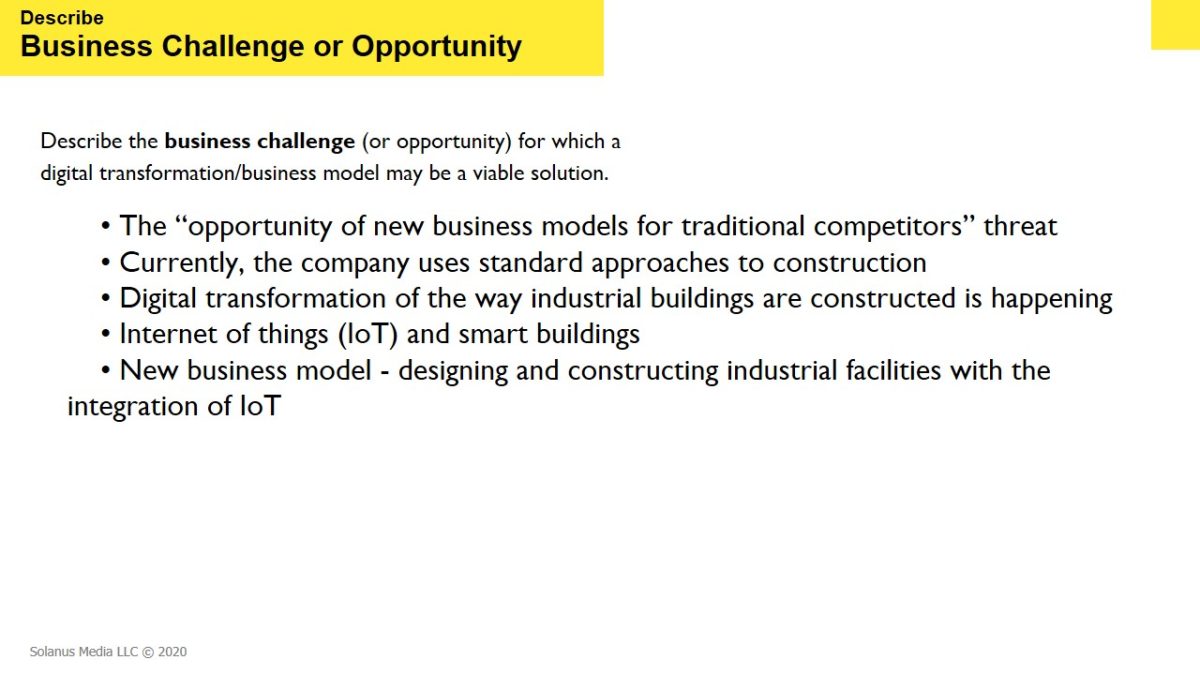
What’s Your Digital Business Model?
Six key questions and actions for transformation in the digital economy.
- What is the digital threat—and opportunity?
- Action: Assess the percentage of your revenues that are under threat.
- Assessment: Digital Threat.
- Which business model is best for your enterprise’s future?
- Action: Target your digital business model.
- Assessment: Four digital business models.
- What is your digital competitive advantage?
- Action: Identify your source of competitive advantage.
- Assessment: Competitive advantage.
- How will you connect using mobile and IoT?
- Action: Determine how you will use mobile and managed digital assets to create value.
- Assessment: Mobile readiness and IoT commitment.
- Do you have the crucial capabilities to reinvent the enterprise?
- Action: Build and strengthen the eight key capabilities.
- Assessment: Digital capabilities.
- Do you have the leadership to make the transition happen?
- Action: Develop your leaders and invest in your culture.
- Assessment: People and culture.
Let’s examine AYTB using the digital business model framework.
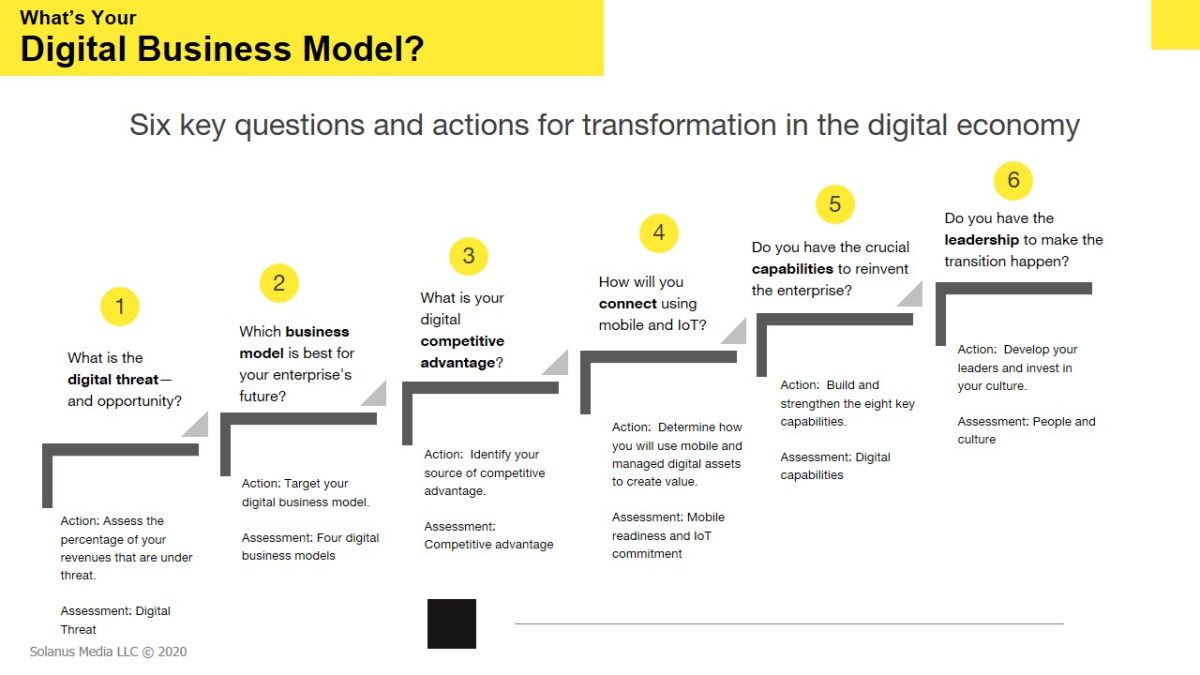
What is the digital threat—and opportunity?
- Threat – manufacturing facilities will integrate IoT devices into their buildings.
- Opportunity – provision of design and construction services to facilities with IoT integration.
- 30% of revenue if under threat.
- 7 out of 10 chance for disruption of AYTB’s leading service.
- Measured through an assessment and comparison with the civil engineering industry.
- Senior management’ mindset is affected by the slow changes within the industry.
Firstly, let’s begin an assessment by defining the digital threat. Based on the rough estimations, around 30% of the revenue is threatened by this digital transformation. AYTB is a multidimensional company, and its revenue comes not only from construction but also from maintenance, turnaround, and other services. One way to assess the digital threat is to examine the likelihood of AYTB’s best selling product being disrupted, which numerically can be expressed as 7 out of 10.
Senior management’s mindset has a direct impact on the assessment of the threat because industrial construction is a well-established industry, which is highly regulated by the government, and standards of construction and changes within it usually take a lot of time.
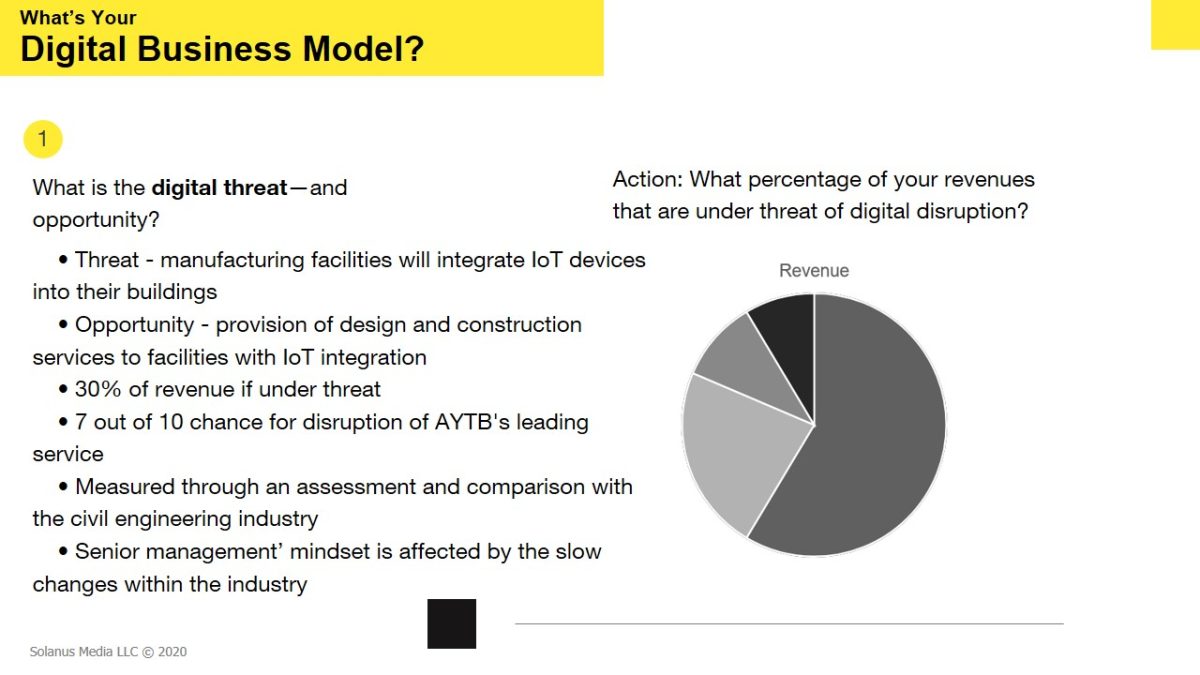
Action: What percentage of your revenues that are under threat of digital disruption?
The answer sheet above contains an assessment of AYTB’s current service – industrial construction.
Based on this assessment, AYTB’s service is moderately threatened by digital disruption. The main benefit is that AYTB provides a tangible product to its customers – such as foundations, pavements, and actual buildings, which cannot be replaced with a digital alternative. This service will not be delivered through digital alternatives, although some parts of the process, such as creating a plan, meeting with the customer, discussing the construction, and others can be done digitally, they are not AYTB’s main filed of work. However, competitors can offer more efficient services by employing the integration of sensors connected to IoT that will create industrial buildings that are more efficient.
Based on this assessment, the percentage of revenue that is under threat is approximately 30%.
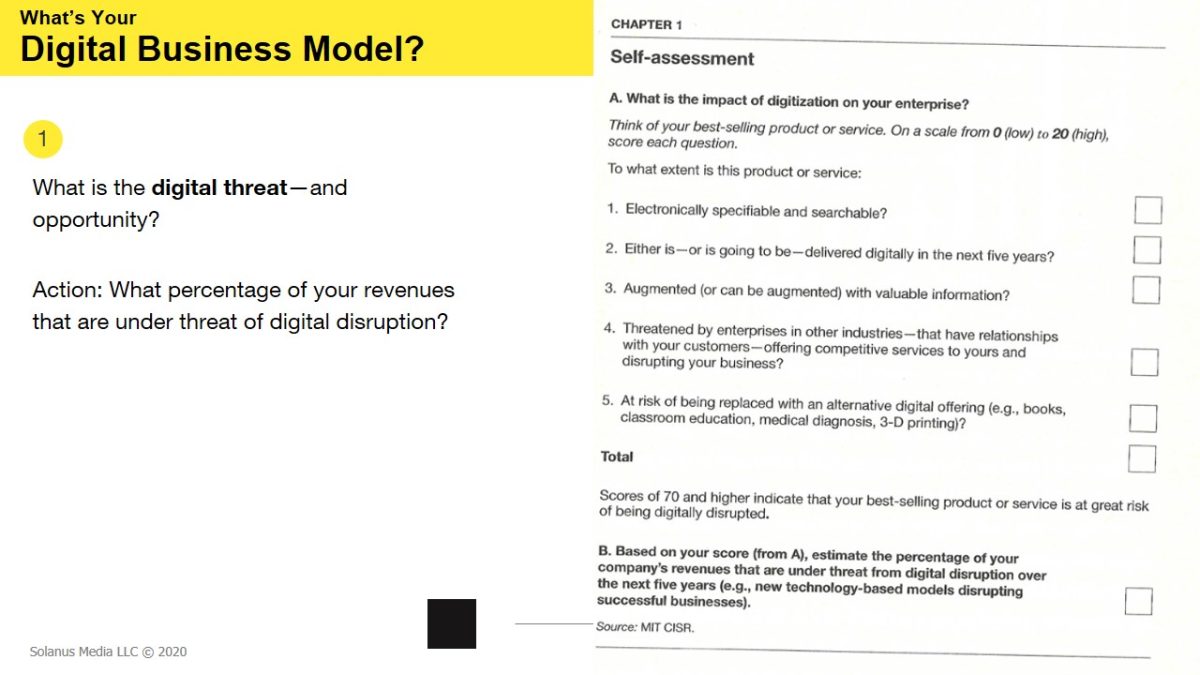
Which business model is best for your enterprise’s future?
Omnichannel:
- Services of industrial construction.
- Maintenance.
- Facility management.
- Working with brown and green facility construction.
- Material procurement.
- Etc.
Next, we will examine what AYTB is currently doing, its business model, value chain, and customers. AYTB is an omnichannel business because it has created a multiproduct for its customers, from working with brown or green, or contaminated and not contaminated land, to producing materials, constructing, and managing the facility. Hence, its business is a part of the value chain, rather than an ecosystem, meaning that it can be controlled more easily, which is usually the case with B2B companies. AYTB’s customers come from across Saudi Arabia and are established businesses in different industries – oil and gas, chemical, power plants, and others.
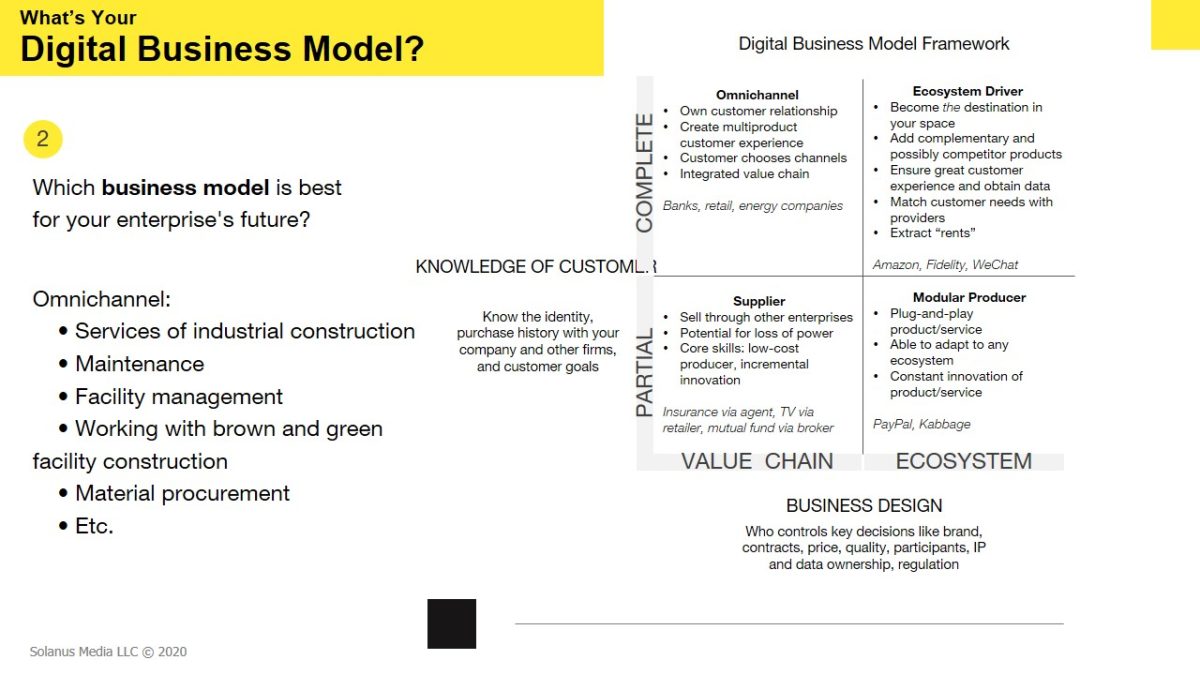
Action: Target your digital business model.
Assessment: Four digital business models.
Ecosystem drivers outperform all other business models on four measures for performance.
Notably, the ecosystem driver model is more effective, because it allows the business to have a greater customer choice, allows to implement innovation more quickly, and offer the best prices. However, as was mentioned, the extent to which AYTB can implement digital transformation as part of its operations is limited by the tangible nature of its services. From the table above, one can see that moving from the value chain model to a different strategy, in general, can be beneficial for AYTB because it will allow for substantial revenue growth and profit margin growth.
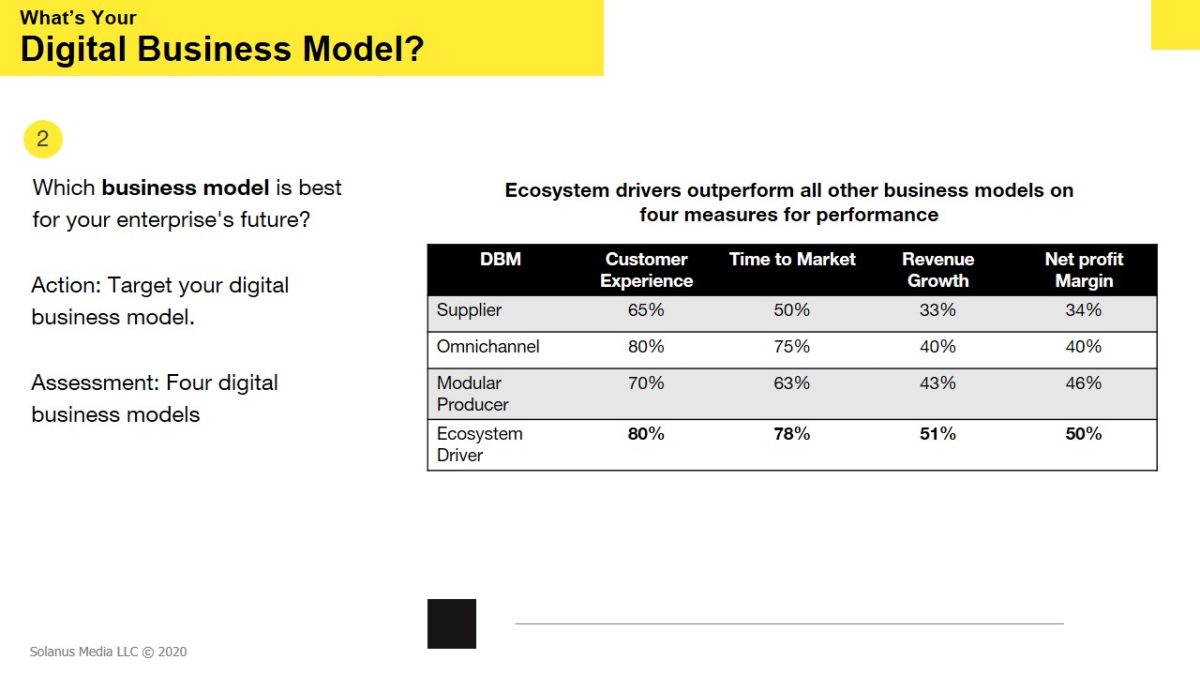
What is your digital competitive advantage?
Action: Identify your source of competitive advantage.
Assessment: Competitive advantage.
Next, AYTB’s competitive advantage should be identified and discussed. Currently, its main advantage is the wide variety of services it provides to its clients, essentially, AYTB can construct from scratch any type of a plant or manufacturing facility, procuring the materials and producing some of them, and offer long term support to its customers by maintaining the buildings, and offering facility management services.
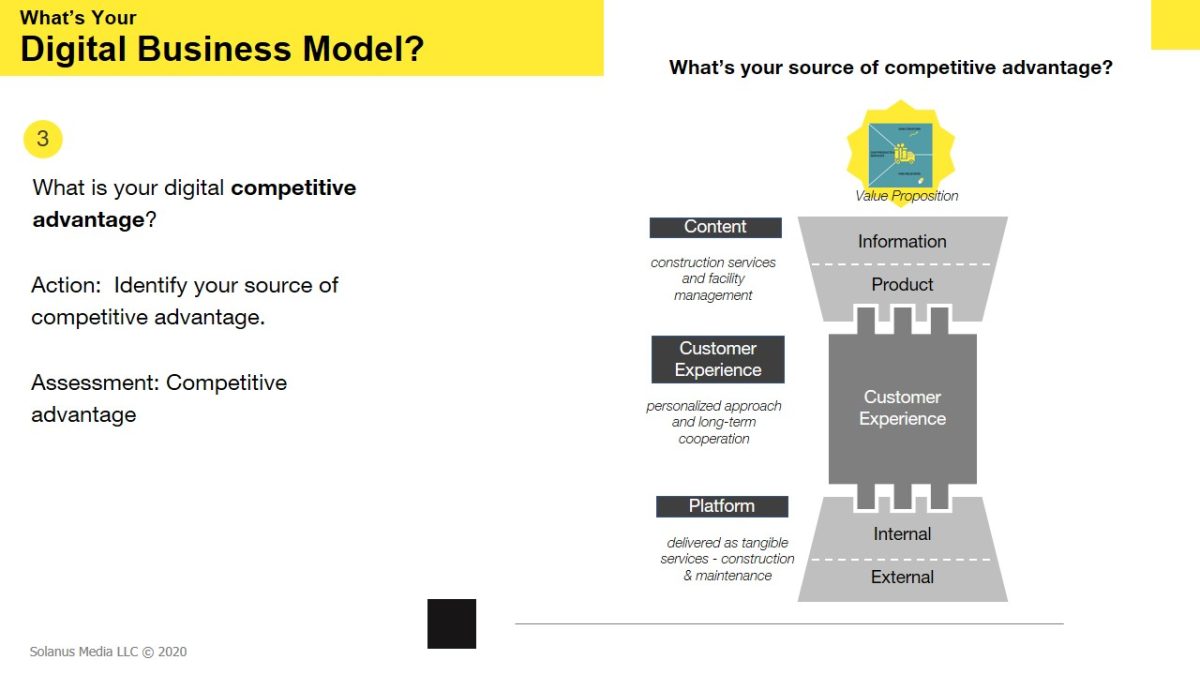
Considerations:
- Do you continually add new or refreshed content?
- Do you know how good your customer experience is?
- How good are your digital platforms? E.g., cloud, SAS, partners, external data?
AYTB’s “content” is its services, and the business has an established set of industrial construction services it provides that are not often updated, mainly, the changes are connected to legal requirements relating to construction standards. However, the current content is valued by the customers because of the broad range of services AYTB offers, essentially, everything a company may need in terms of construction and facility management can be done by AYTB. The responsibility for digital and physical products is help by different teams since AYTB only recently decided to evaluate the benefit of integrating digitalization and IoT in its service range. It should be noted that currently, AYTB does not generate revenue online, since its contracts are mainly signed through meetings with clients, which is another opportunity for growth.
AYTB typically works with customers long-term, which is the first indicator of the excellent quality of services it provides. Additionally, it uses benchmarking and assessment of customer satisfaction to determine the quality of its services. It is highly probable that at the current rate of digitalization, the customers will be frustrated with AYTB’s lack of integrating the IoT in the building construction and lack of digital services to support facility management.
AYTB uses digital platforms in its internal operations – to collect and analyze data and manage projects, which are mainly done through the cloud. This may be a challenge for a digital transformation because AYTB will have to find new partners or develop new solutions by itself to address IoT and other opportunities.
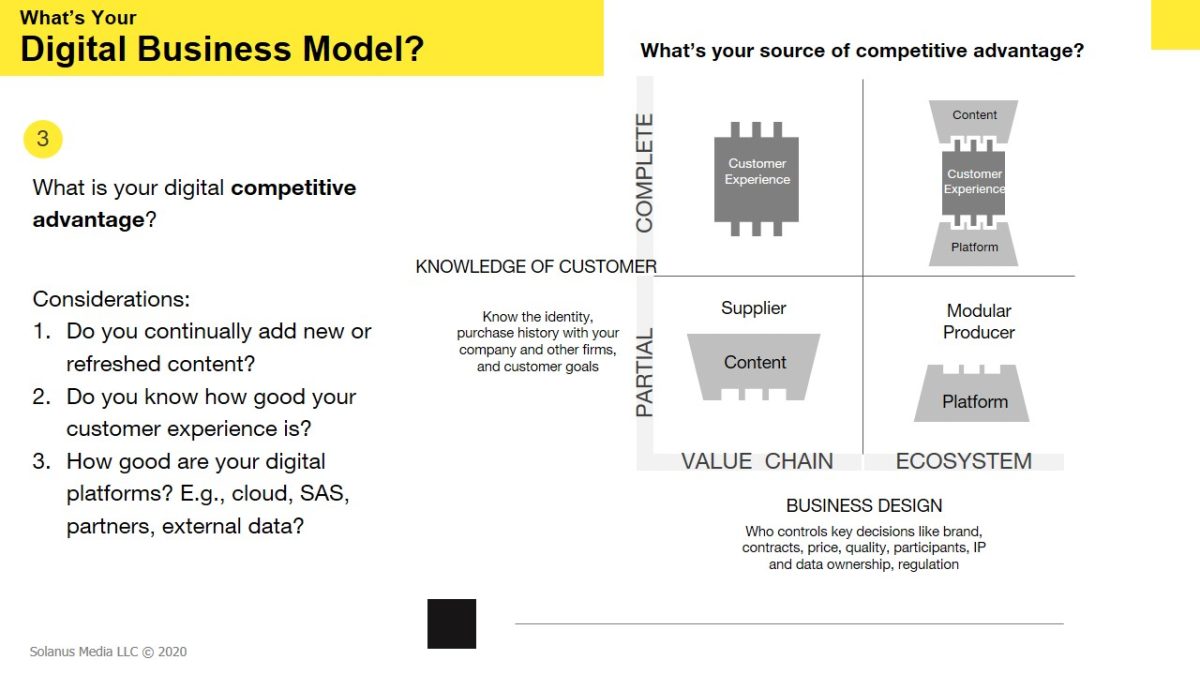
In this slide, each of the three sources of competitive advantage can be seen rated on the basis of their importance now and in three years and their order of importance. This assessment helps identify the main area that should be addressed as part of digital transformation. Here, the most significant change is attributed to the platform, which ranks as five today and 8 in three years, with the level of importance of 2. It is because AYTB should focus on integrating a digital solution for supporting the development and maintenance of the industrial facilities it constructs, for example, to allow the customers to monitor the energy expenditures of their buildings, temperature, and more intricate things such as a number of employees, output and other metrics through AYTB’s services and integration of IoT sensors. This is also linked to the content that AYTB offers since the integration of sensors that will allow collecting and analyzing this data will become extremely important within the next three years.
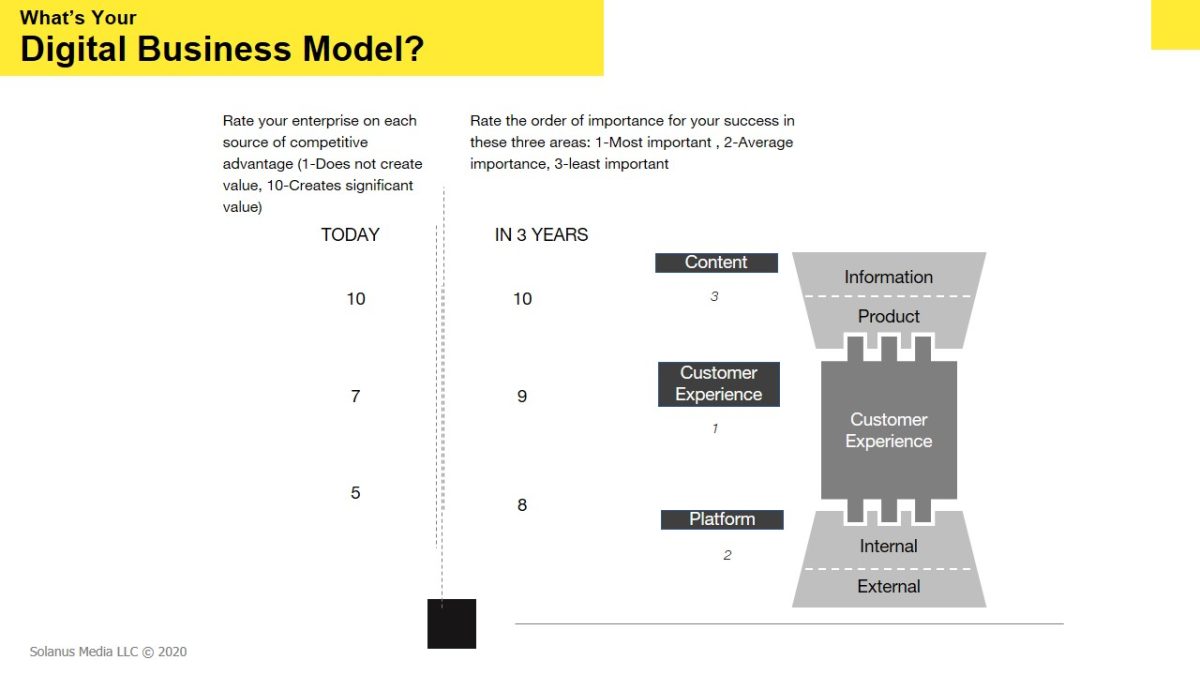
How will you connect using mobile and IoT?
Considerations:
- How are you using mobile to manage digital assets and create value?
- What opportunities for value creation does IoT offer your enterprise?
Currently, AYTB’s integration with digital platforms is moderate, and the company does not use mobile to create additional value. IoT offers a completely different approach to the way AYTB constructs buildings, manages its operations and provides facility management services. Mainly, this can be achieved by integrating sensors into the facilities it constructs and providing clients with a digital platform where this information is collected and can be presented to them created more value to the clients.
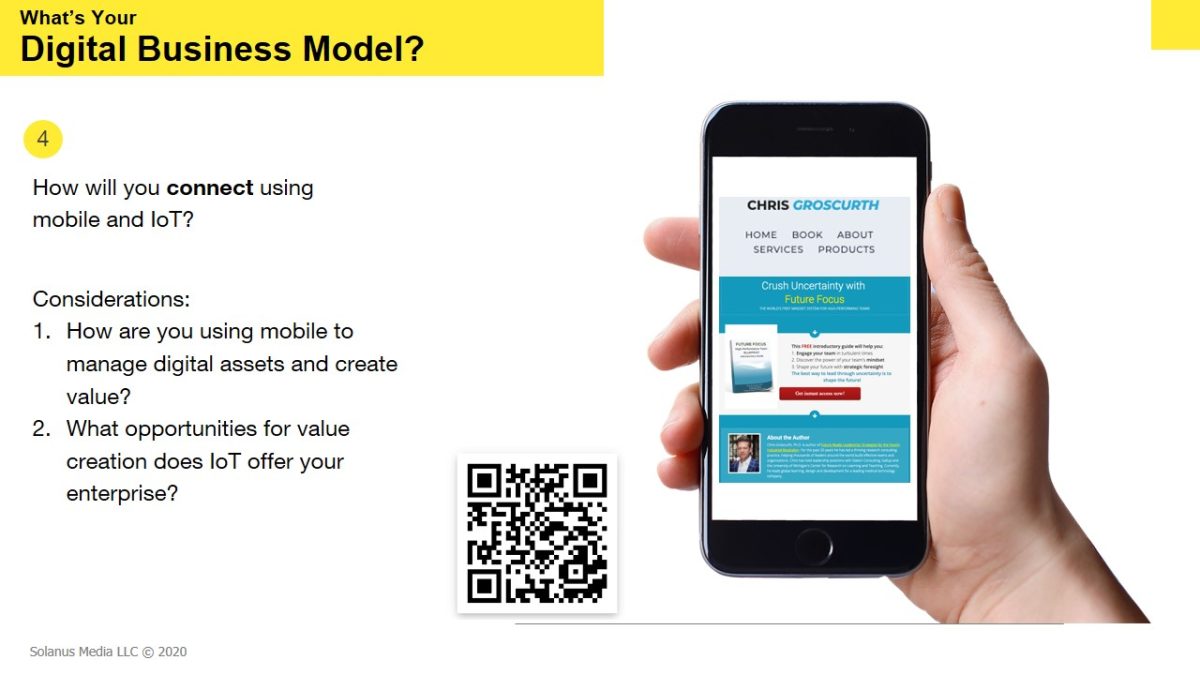
Based on this self-assessment, the average score for mobile readiness is 30 out of fifty, although top-margin enterprises show 35 points out of fifty. Improvements can be made in the domain of capturing and utilizing customer data from mobile channels, and more attention can be dedicated to integrating API. In terms of IoT readiness, the average score for AYTB is 18 out of 50 and 29 out of 50 for top margin enterprises. Here, an issue arises because IoT’s importance in construction is becoming more and more important, and AYTB will have to integrate it into its services to maintain a competitive advantage. Evidently, the main issue is the need to persuade the management of the necessity to address the disruption that is about to happen.
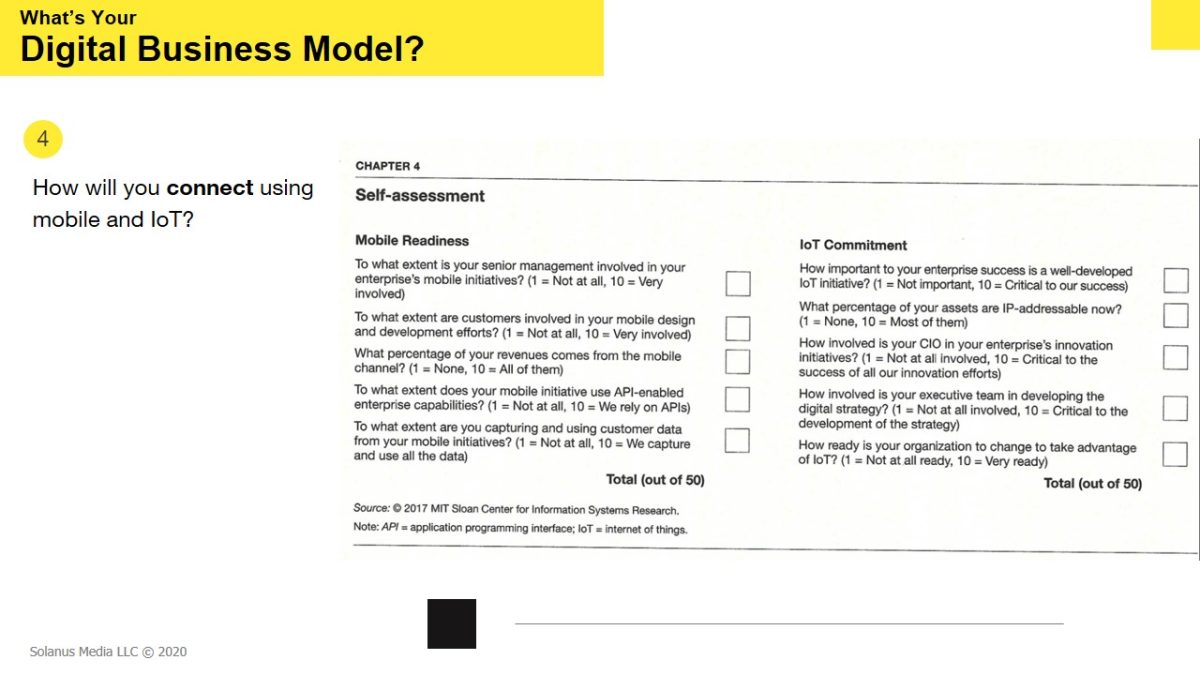
What are the crucial capabilities to reinvent the enterprise?
8 Crucial Capabilities:
- Capabilities for Moving Up on the DBM Framework:
- Gathering and using customer data about life events.
- Amplifying the customer voice inside the enterprise.
- Creating a culture of evidence-based decision-making.
- Providing an integrated, multiproduct, multichannel customer experience.
- Capabilities for Moving Right on the DBM Framework:
- Being distinctive and the first place your best customers go when a need arises.
- Identifying and developing great partnerships and acquisitions.
- Service-enabling what makes you great—with exposed APIs.
- Developing efficiency, security, and compliance competencies.
In terms of crucial capabilities to reinvent the enterprise, which requires a vision for how IoT and digitalization will be integrated into AYTB’s processes and what value this will provide to the consumer. It is evident that AYTB should start with creating a digital culture – dedicating more attention to the use of digital tools and platforms when working with clients, managing employees and operations, and for other activities. The DBM network helps address this problem by providing a structure for changes that AYTB can adopt. Based on the DBM, AYTB can choose to transform into the ecosystem, by moving up and then to the right in the DBM structure, but this is a highly challenging path.
Arguably, AYTB has young leaders who believe in the need to predict disruptions and respond to them. Its top management is accepting of new ideas and changes when their beneficial impact on the value provided by AYTB outweighs the costs and risks associated with the implementation of the IoT. This creates a good basis for the new and more digitally oriented culture and the implementation of innovational technical capabilities.
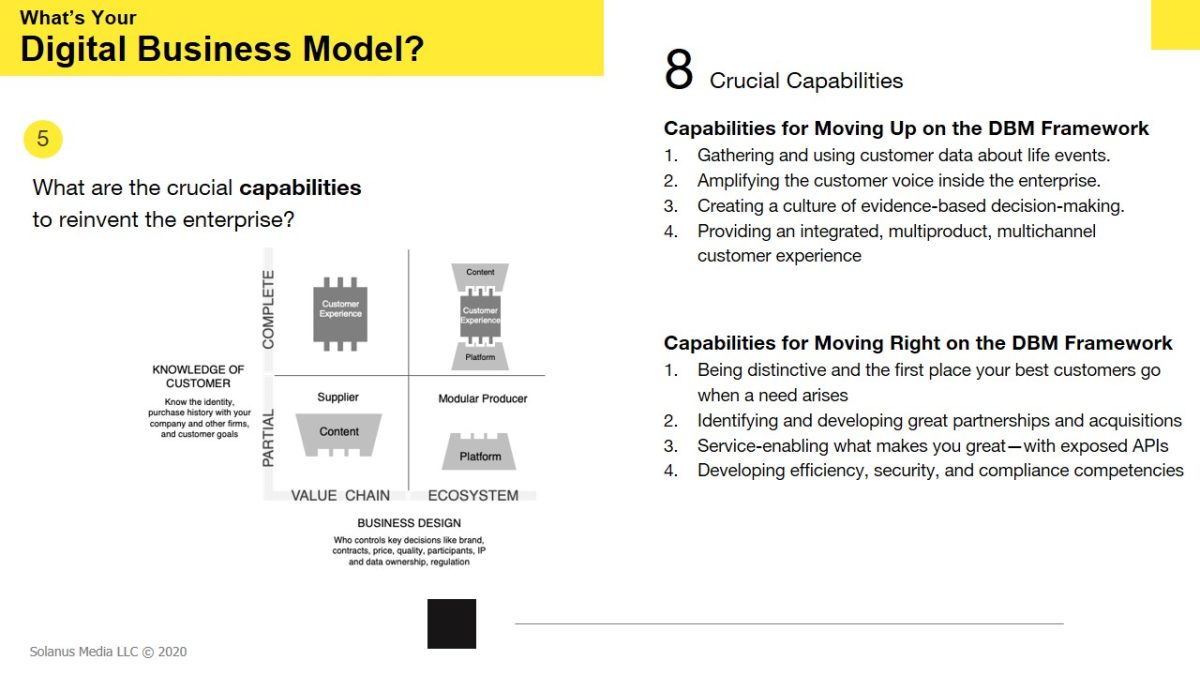
Do you have the crucial capabilities to reinvent the enterprise?
Action: Build and strengthen the eight key capabilities.
Assessment: Digital capabilities.
Here, the score target is 70, with 8% of the companies being ready for the transformation. This shows that AYTB has some of the key capabilities that will allow reinventing itself when addressing digital disruption. Moreover, because AYTB incorporates a large number of enterprises and company branches, it is vital to focus on improving these capabilities across these entities, with the main focus on gathering and utilizing data about customer life experience and amplifying their voice inside AYTB to provide services that can better satisfy the needs of the clients. One example of this can be the integration of data science as the main analytics approach to collect and analyze data about AYTB’s partnerships. To move right with the DBM framework, AYTB may choose to create a digital platform where customers can order its services, such as building maintenance, use AYTB’s IoT capabilities to examine their buildings, and communicate with AYTB’s support. Here, the integration of API becomes essential.
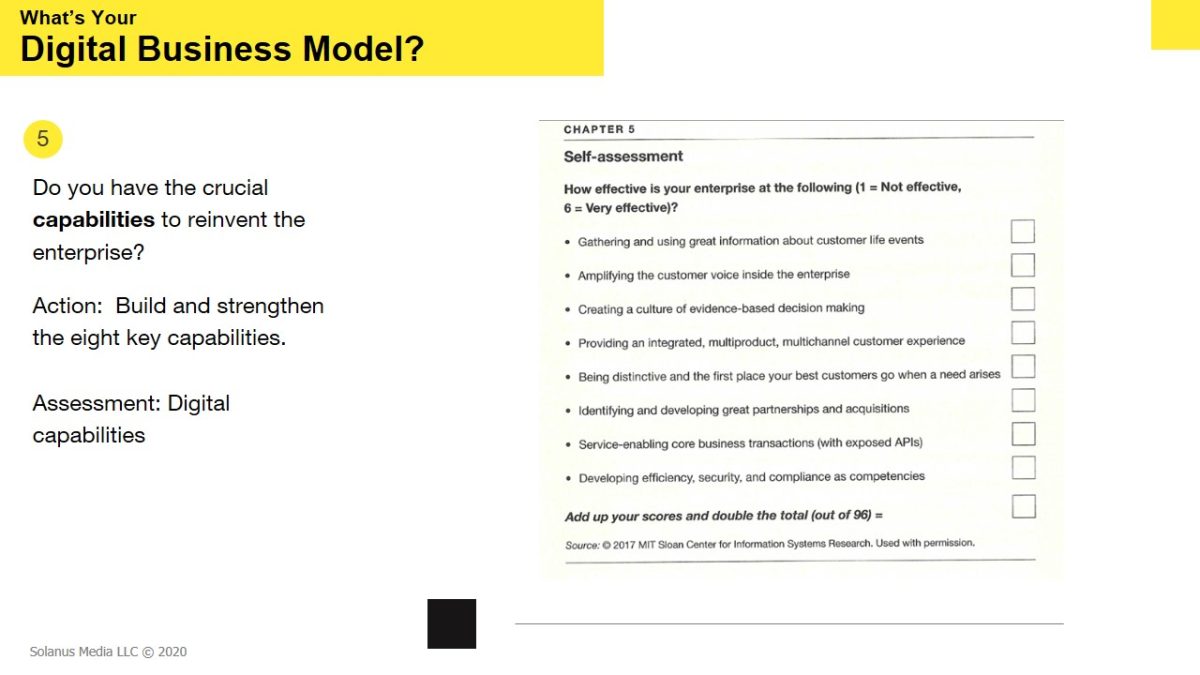
Do you have the leadership to make the transition happen?
Action: Develop your leaders and invest in your culture.
Assessment: People and culture.
The leadership can either help make the changes easy and feel effortless as innovation, and new processes are integrated into the business, or place many obstacles that will make these changes impossible. Arguably, AYTB has the leadership who possess skills and expertise to make the change happen. This assessment considers the leaders from the top and down levels, which improves the chances of AYTB becoming an ecosystem driver. It is evident that the process of change must be top-down since AYTB consists of many smaller enterprises, and to facilitate simultaneous change, the Board has to create a strategy and communicate it to the CEOs and the workforce.
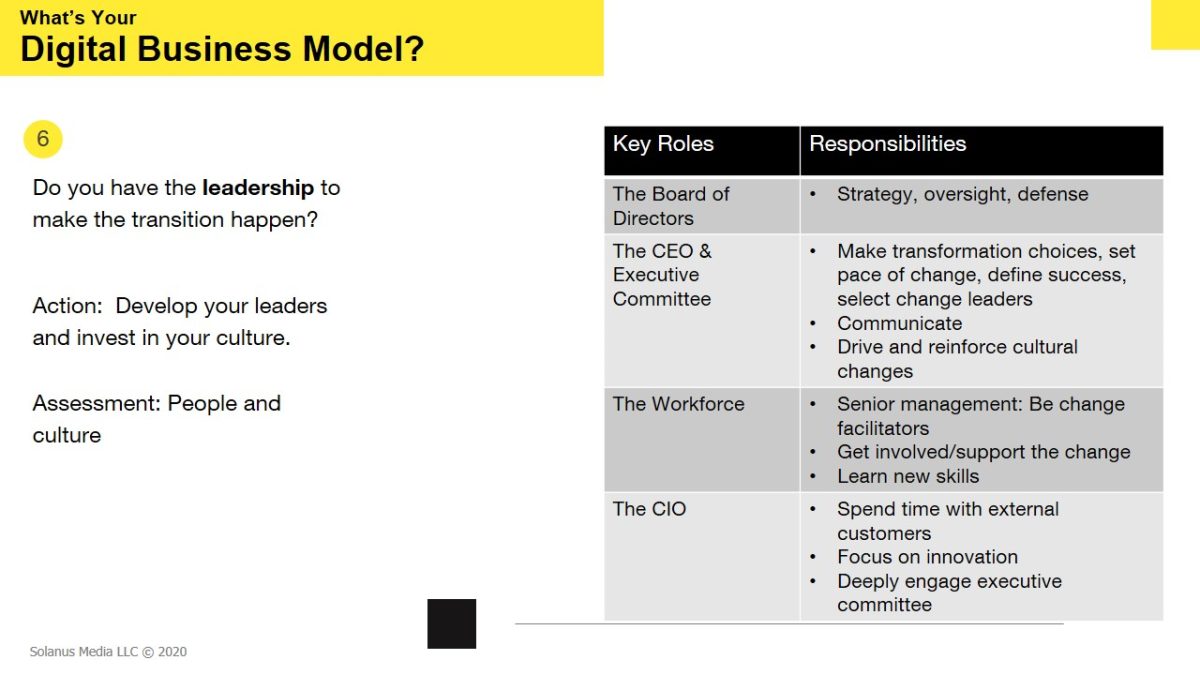
Finally, the digital capabilities of the Board inevitably affect their mindset and readiness to change. In AYTB’s case, the self-assessment scores show 60 out of 100, showcasing that the Board may not perceive the proposed digitalization and IoT changes as necessary. This is a very good result, considering the score of top performers in Weil and Woerner’s book is 68. Hence, AYTB has a good potential to enable changes towards digital transformation, and the development of the digital culture enacted bu the Board, and CEOs should help the process of digitalization. To conclude, digital disruption can be viewed as an opportunity for AYTB because the company is well-established, with a wide range of services for its customers and, based on the assessments, is ready to integrate innovation into its operations. The main focus is on moving from the omnichannel model to the ecosystem driver strategy. Using the DBM framework, AYTB should move up by gaining a better understanding of its customers, and than move right by becoming a distinctive company for its customers.
